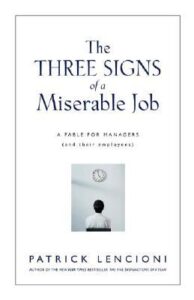Years ago, at a moment of despair, I left my desk and rushed through the corridors to a very warm, welcoming library. It’s no surprise that the neon-lit, grey walled library was warmer and friendlier than the spacious, sunlit workspace where my desk was. I have always been drawn to libraries, and I spent the best moments in them. They have always served as a sanctuary, especially on that day, a day I felt miserable, and was desperate for salvation, in a book or a conversation or anything that recharged me enough to finish that workday and go home safely.

I looked through all the self-help books lying idly on the shelves of a medical library, underutilized and underappreciated, and I found it, a book titled “The Three Signs of a Miserable Job: A Fable for Managers (And Their Employees)” by Patrick Lencioni. The story revolves around this CEO who has become a pizzeria manager, and through his story and his encounters with the employees, the author, Patrick Lencioni, identifies three elements that make people miserable at work; irrelevance, immeasurability, and anonymity, and then shares the keys to make any job more fulfilling.
Anonymity and the invisible people
When I first moved to the GCC, I realized that people could work in a place for years without having any real conversation with any of the other employees. People who provide cleaning services, work in the pantry or security guards are mostly uninvolved in anything external to their specific work descriptions. No awards are presented to them during annual celebrations, no invites are extended to them in any functions, and they barely have any meaningful conversation with any of the employees. That was the time I developed a new life motto: “people should never get used to being invisible.” I would stop and have random talks with people who are technically my colleagues, and they would be startled and would rush to ask me if I needed anything. I guess Lencioni didn’t imagine the situation could be that dire when he wrote his book. But it doesn’t stop there. People who are introverted, people who are too timid to speak in meetings and people who provide work that might be auxiliary in nature, all those people can feel invisible. Coming to work everyday and feeling like people around you do not know who you are or what your personal or professional objectives are. People who feel unseen or anonymous to their peers and their leaders can never be happy at work. They are isolated and do not feel engaged at work.
The way that I see it; one main reason I am miserable at work, any work, is the lack of human interaction. Having to work alone and not share my ideas with others can make me hate any job regardless of what the project was. And for the longest time, I judged myself as not professional enough or not serious enough, and while it might be easier to hide behind some psychological jargon or some personality types; the answer is simple; I crave human interaction and I need it to recharge, and I almost always feel better after meetings unlike lots of other people. I find the expectation to come and fill our hours at work with tasks and documents and deliverables without spending quality time simply unrealistic. I am not suggesting we waste away hours chatting, but a few minutes of meaningful interaction, catching up with team members instead of merely sending status updates online offers more sustainability to the future of the team and its dynamics.
Some may argue productivity, others may shove KPIs in my face while some other folks may give up completely and turn the whole argument into a meme “you are not born to go to work and pay the bills!”, well guess what, I do need to pay the bills, but I don’t need to sacrifice my true self for it. A work place where you can’t spend some time sharing your thoughts about a book you read or a movie you watched is not a place where your soul can thrive and while I will never advise anyone to quit, I do believe there are ways to combat that, collectively, including the introverts who do not want to share parts of themselves with others. They can find a safe space where they can be themselves, effortlessly, we all can.
Compassionate leadership
If the pandemic did us any favors, it would be the change in the work culture, or at least the dialogue about. Debates about work-life balance, agile work environments, and compassionate leadership are bringing to light issues that many struggled with for decades but, perhaps, the world was not ready yet. It needed a global pandemic to shake things up!
Compassionate leadership is people oriented. It focuses on relationships and aims at empowering people to do their best work. It is claimed to result in higher engagement and motivation among employees and positively impacts their wellbeing. Could compassionate leadership be the answer to our problems? Can we get everyone engaged and motivated? Will we be able to make everyone feel seen and heard? These are questions to which I have no answer. All I can say is, we can only do so much. Let’s bring humanity to the workplace and let’s get curious about each other again.

1,518 comments for “The pizzeria manager that guided my career choices!”